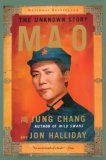Summary | Excerpt | Reviews | Beyond the Book | Readalikes | Genres & Themes | Author Bio

Critics' Opinion:
Readers' Opinion:
First Published:
Oct 2005, 832 pages
Paperback:
Nov 2006, 864 pages
 Book Reviewed by:
Book Reviewed by:
BookBrowse Review Team
Buy This Book
Mao was the third son, but the first to survive beyond infancy. His
Buddhist mother became even more devout to encourage Buddha to protect
him. Mao was given the two-part name Tse-tung. Tse, which means "to
shine on," was the name given to all his generation, as preordained
when the clan chronicle was first written in the eighteenth century;
tung means "the East." So his full given name meant "to shine on
the East." When two more boys were born, in 1896 and 1905, they were
given the names Tse-min (min means "the people") and Tse-t'an (tan
possibly referred to the local region, Xiangtan).
These names reflected the inveterate aspiration of Chinese peasants for
their sons to do well—and the expectation that they could. High
positions were open to all through education, which for centuries meant
studying Confucian classics. Excellence would enable young men of any
background to pass imperial examinations and become mandarins—all the
way up to becoming prime minister. Officialdom was the definition of
achievement, and the names given to Mao and his brothers expressed the
hopes placed on them.
But a grand name was also onerous and potentially tempted fate, so most
children were given a pet name that was either lowly or tough, or both.
Mao's was "the Boy of Stone"—Shisan yazi. For this second "baptism" his mother took him to a rock about eight feet high, which
was reputed to be enchanted, as there was a spring underneath. After Mao
performed obeisance and kowtows, he was considered adopted by the rock.
Mao was very fond of this name, and continued to use it as an adult. In
1959, when he returned to Shaoshan and met the villagers for the
first—and only—time as supreme leader of China, he began the dinner
for them with a quip: "So everyone is here, except my Stone Mother.
Shall we wait for her?"
Mao loved his real mother, with an intensity he showed towards no one
else. She was a gentle and tolerant person, who, as he remembered, never
raised her voice to him. From her came his full face, sensual lips, and
a calm self-possession in the eyes. Mao would talk about his mother with
emotion all his life. It was in her footsteps that he became a Buddhist
as a child. Years later he told his staff: "I worshipped my mother . .
. Wherever my mother went, I would follow . . . going to temple fairs,
burning incense and paper money, doing obeisance to Buddha . . . Because
my mother believed in Buddha, so did I." But he gave up Buddhism in
his mid-teens.
Mao had a carefree childhood. Until he was eight he lived with his
mother's family, the Wens, in their village, as his mother preferred
to live with her own family. There his maternal grandmother doted on
him. His two uncles and their wives treated him like their own son, and
one of them became his Adopted Father, the Chinese equivalent to
godfather. Mao did a little light farm work, gathering fodder for pigs
and taking the buffaloes out for a stroll in the tea-oil camellia groves
by a pond shaded by banana leaves. In later years he would reminisce
with fondness about this idyllic time. He started learning to read,
while his aunts spun and sewed under an oil lamp.
Mao only came back to live in Shaoshan in spring 1902, at the age of
eight, to receive an education, which took the form of study in a
tutor's home. Confucian classics, which made up most of the
curriculum, were beyond the understanding of children and had to be
learnt by heart. Mao was blessed with an exceptional memory, and did
well. His fellow pupils remembered a diligent boy who managed not only
to recite but also to write by rote these difficult texts. He also
gained a foundation in Chinese language and history, and began to learn
to write good prose, calligraphy and poetry, as writing poems was an
essential part of Confucian education. Reading became a passion.
Peasants generally turned in at sunset, to save on oil for lamps, but
Mao would read deep into the night, with an oil lamp standing on a bench
outside his mosquito net. Years later, when he was supreme ruler of
China, half of his huge bed would be piled a foot high with Chinese
classics, and he littered his speeches and writings with historical
references. But his poems lost flair.
Excerpted from Mao by Jung Chang and Jon Halliday Copyright © 2005 by Jung Chang. Excerpted by permission of Knopf, a division of Random House, Inc. All rights reserved. No part of this excerpt may be reproduced or reprinted without permission in writing from the publisher.





The Flower Sisters
by Michelle Collins Anderson
From the new Fannie Flagg of the Ozarks, a richly-woven story of family, forgiveness, and reinvention.

The House on Biscayne Bay
by Chanel Cleeton
As death stalks a gothic mansion in Miami, the lives of two women intertwine as the past and present collide.

The Funeral Cryer by Wenyan Lu
Debut novelist Wenyan Lu brings us this witty yet profound story about one woman's midlife reawakening in contemporary rural China.
Your guide toexceptional books
BookBrowse seeks out and recommends the best in contemporary fiction and nonfiction—books that not only engage and entertain but also deepen our understanding of ourselves and the world around us.